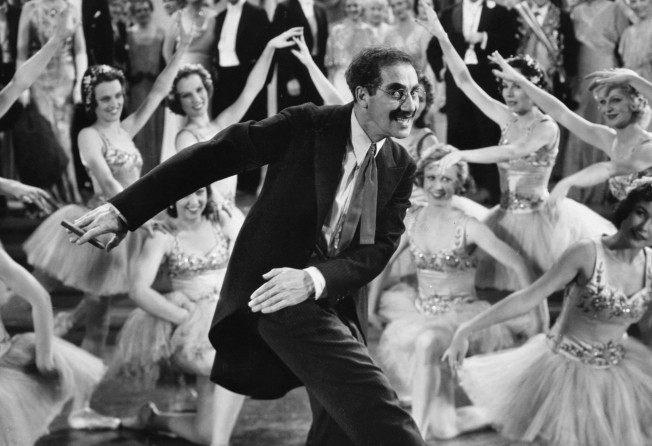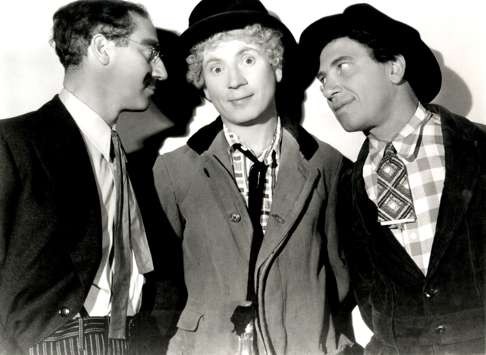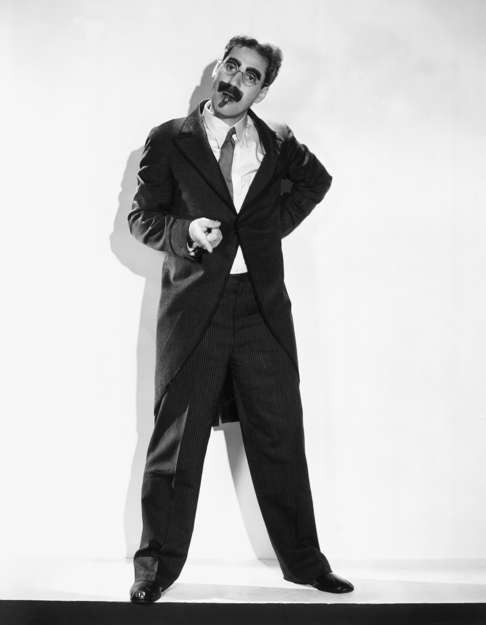
Book review: Groucho Marx by Lee Siegel – close, but no cigar
This provocative biography argues that Groucho – the ‘central intelligence’ of the Marx Brothers – wasn’t actually funny, but was in fact just a nihilistic truth-teller. Seriously?


by Lee Siegel
Yale University Press
2/5 stars
In 1967 Groucho Marx made what now seems an unlikely appearance on conservative pundit William F Buckley ’s TV show Firing Line. The show typically consisted of Buckley, a starchy screen presence who gave the impression of looking down his nose at the camera, politely putting what were often quite barbed questions to that week’s guest. Whatever Buckley’s politics, it was serious television, with a solemn atmosphere somewhere between a civics lesson and a Sunday mass. To add to the formality, the discussion was moderated by a chairman. The subject Buckley and Marx would discuss: “Is the world funny?”
The programme was an hour long, and began amiably, if stiffly, as Buckley introduced his guest. Then in his mid-70s, Groucho, whose casual attire of a blue jacket, polo neck and grey plaid trousers contrasted with Buckley’s suit and tie, was still recognisable from his heyday, when as a member of the Marx Brothers he had leered and delivered comic non sequiturs (“One morning I shot an elephant in my pyjamas. How he got in my pyjamas I don’t know”) over the course of vaudeville shows, Broadway productions and a run of classic, and some not so classic, comedy movies.
When he sat down to debate with Buckley, the greasepaint moustache and eyebrows were long gone, but he was smoking his trademark cigar. He began to answer questions quite seriously, and it turned out that Groucho didn’t think the world was funny after all. Was he serious or funny? Where did the persona stop and the real Groucho begin? These are the questions Lee Siegel wrestles with in his provocative and perverse short critical biography of the man he calls the Marx Brothers’ “central intelligence”.
Siegel identifies a moment in the Buckley interview where Groucho goes on the attack by pointing out that the host blushes “like a young girl”. Groucho’s comedy, Siegel insists, is actually radical, nihilistic truth-telling that masks the great comedian’s insecurity; its origins lie in his childhood, with his domineering mother and weak father, and his thwarted intellectual ambitions. A quiet middle child born as Julius Marx to European Jewish emigrants, who lived on the upper east side of Manhattan, Groucho wanted to be a doctor, but instead had to leave school young to join his brothers in show business.
You might think that consistently arguing that the Marx Brothers aren’t funny is a difficult trick to pull off, and you’d be right, but it is central to Siegel’s theory that the Marxes were the same onscreen as they were off, that there was “a seamless continuity between their actual personas and their stage personas … fusing their entertainment selves with their real selves”. Instead of making riotous film comedies that seemed to fizz from the screen, they “dissolved the boundary between life and art, public and private”. It is difficult to decide whether his is a strongly held belief or a confrontational pose.

Putting aside the obvious differences (Groucho’s moustache was fake; Chico wasn’t Italian; Harpo could in fact speak), there is considerable evidence that elements of the stage personae – Groucho’s stinginess, Chico’s gambling and womanising, and Harpo’s, well … harp playing – were the brother’s real-life attributes. After all, the stage names originated as nicknames reputedly given to them by the performer Art Fisher during a card game in 1915. The names stuck, onstage and off.
It isn’t hard to see the plausibility of Siegel’s version of Groucho as not a nice, avuncular figure but rather an asshole telling everyone what he really thinks of them. Where I would differ from Siegel would be in finding an asshole telling everyone what he really thinks of them funny, especially within the structure of a 1930s comedy movie.
As a child I loved the Marx Brothers’ wild energy, the way they bounced around the creaky confines of their films, intersecting awkwardly with banal, romantic subplots and subverting the musical numbers through bad dancing and off-key singing. There is no doubt that something about them had an effect that was more potent than the spell cast by Chaplin or, say, Abbott and Costello. Could that something have been the “shocking truthfulness” that Siegel identifies in their work?

After the relative commercial failure of their cynical 1933 anti-war film Duck Soup, which cut back on romantic subplot, the brothers moved from Paramount to MGM, where they made A Night at the Opera and A Day at the Races – crowd-pleasing, well-made films that embedded the brothers in a social situation and prioritised the romance storyline. One would think Siegel, who criticises Groucho’s general inability to appear “in a specific social context”, would be happy. But, no: “unfunny”.
In the late 1940s, as the Brothers’ film career ground to a halt, Groucho began to host the quiz show You Bet Your Life, first on radio and then on TV. Siegel sees this as the point at which his personality and persona “merged comfortably, definitively, in full public view”. Yet when the producers of the show asked Groucho to wear the greasepaint and frock coat, he told them “the hell I will. That character’s dead. I’ll never go into that again.”
There is a joke that dates back to the Brothers’ Broadway play I’ll Say She Is!, where Chico says, “The garbage man is here,” and Groucho replies, “Well, tell him we don’t want any.” Siegel writes that it’s “not funny”, but when, during his interview with Groucho, Buckley repeats the gag, the previously silent Firing Line audience laughs. Surely a joke is bombproof if even the staid Buckley can raise a chuckle with it? Groucho began that show by professing that he is a “sad man”, but as the discussion progressed, he started to arch his back, wave the cigar, joke with the chairman and play to the audience. It is as if a switch has been flipped, and the old Groucho character has come to life again.
The Guardian